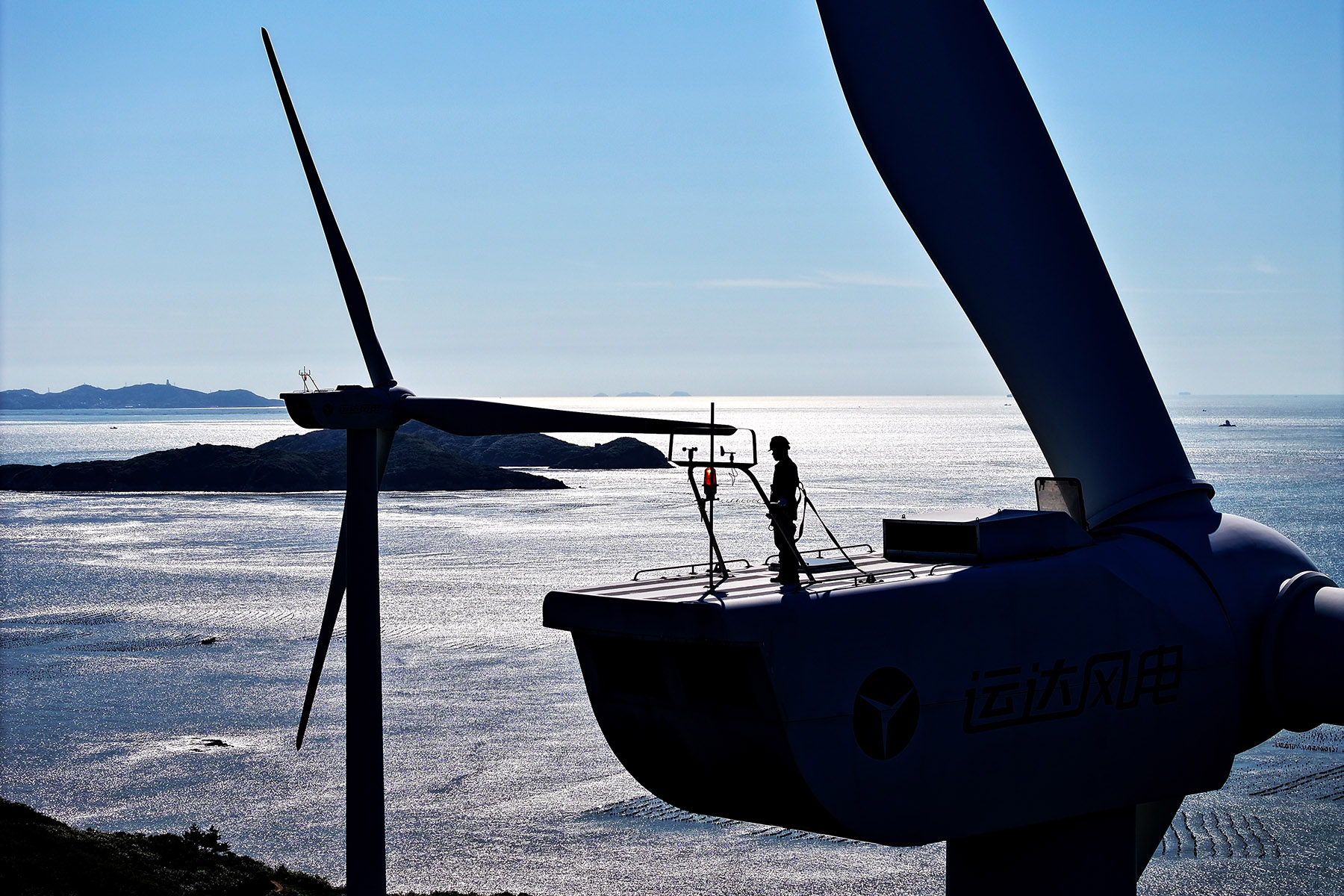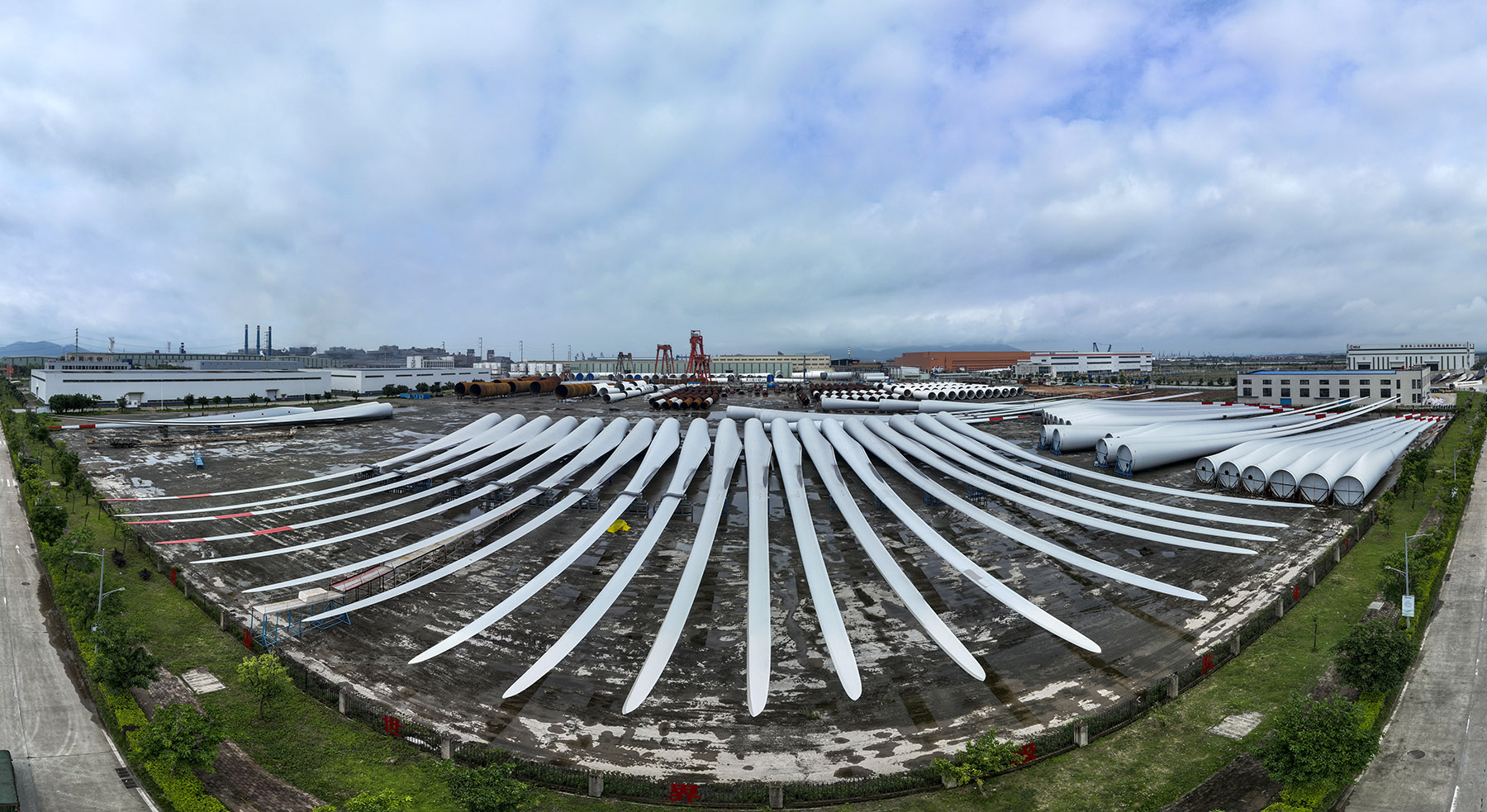China's 2023 production capacity for such products 60 percent of global total, despite prices plummeting 30 percent

Chinese wind turbine manufacturers have been accelerating their global expansion in recent years, exhibiting their prowess at home and abroad, driven by technological advances and large-scale investment, said industry experts and company executives.
While Chinese wind turbine manufacturers have struggled to compete with international giants such as Vestas and General Electric for a long time, they have solidified their position as global leaders in recent years, setting new records while shaping the future of green energy worldwide, they said.
Chinese wind turbine manufacturers are making strides in the overseas wind power market, securing notable contracts in recent years, said global consultancy Rystad Energy.
READ MORE: Report: Renewables provided record 30% of global electricity in 2023
While the scale of these international orders remains minor compared to domestic demand in China, they hold strategic importance, helping Chinese original equipment manufacturers accumulate a track record while gaining global recognition, much like what the solar power sector experienced a decade ago, it said.
Guangdong province-based Mingyang Smart Energy Group, for example, has delivered 30 megawatts of wind turbines for the Taranto offshore wind farm in Italy, and is also one of seven contenders in Norway's first commercial offshore wind farm tender. Meanwhile, Zhejiang province-based Windey Energy Technology Group Co Ltd has secured nearly 1 GW of deals in Serbia from Italian energy company Fintel Energia.
Some of the country's wind turbine manufacturers are also contemplating establishing manufacturing bases or acquiring projects abroad, or setting up production facilities in countries like Brazil and India for a larger share of the global market, it said.
Qin Haiyan, secretary-general of the Chinese Wind Energy Association, said supportive industrial policies have been instrumental in the rapid development of China's wind energy sector in recent years, positioning the country as the global leader in renewable energy capacity and related technological advancement.
Chinese OEM firms have dominated the domestic and international markets with an unprecedented number of new turbines, achieving the global lead in average turbine size, Qin said.
China has by far the world's largest wind turbine production capacity, or 60 percent of the total 163 GW in 2023, according to the Brussels-based Global Wind Energy Council. Production capacity in Europe and the United States, by contrast, stood at 19 percent and 9 percent respectively, it said.
China has long supported the development of wind farms and turbine production as part of its ambitious climate goals to reach peak emissions before 2030. In an annual report to China's legislature in March, Premier Li Qiang vowed to unleash new quality productive forces to drive growth in high-tech manufacturing.
Consultancy Wood Mackenzie said Chinese wind turbine makers' expanding presence on the global stage, which made up four of the world's top five manufacturers last year — the first time they achieved such dominance worldwide — came on the back of strong growth in their home market.
China exported about $1.42 billion worth of wind turbines and components to the EU last year, it said.
Chinese turbine manufacturer Xinjiang Goldwind Science & Technology Co Ltd had the largest foreign footprint of the Chinese players, with 748 MW, followed closely by Envision with 561 MW and Vestas — the only Western OEM firm in the global top five — according to the 2023 Global Wind Turbine Market Shares report from BloombergNEF.
The accelerated installations, combined with a mature supply chain and ambitious provincial targets, are pushing wind deployment to an unprecedented level in China, it said.

It's no surprise that Chinese wind turbine makers dominated the top 10 firms providing turbines worldwide last year, as buildout of gigawatt-scale wind projects sent installations soaring, said Cristian Dinca, wind analyst at BloombergNEF.
In the offshore wind sector, Chinese turbine maker Mingyang Smart Energy Group doubled its annual installations to almost 3 GW last year, becoming the largest global supplier of offshore turbines for the first time.
Mingyang unveiled plans last year for a new offshore wind turbine, which, at 22 MW, will be the largest such turbine in the world.
In addition to output, Chinese wind turbine manufacturers also lead in product design and innovation. The last four years have seen 426 new Chinese turbine models released, versus just 29 new turbines outside China.
Chinese companies commissioned 1.7 GW of wind projects in 20 overseas markets last year, including five EU member states, almost three times as many markets as in 2018, the BloombergNEF report said, adding that prices for Chinese turbines are about 20 percent lower than US and European equivalents.
The top five destination countries for Chinese manufactured wind turbine exports have been Vietnam (23 percent), followed by Australia (13.1 percent), India (7.4 percent), the US (6.4 percent) and Kazakhstan (5.2 percent) during the past few years, with a growing interest in exports to emerging markets such as the Middle East and Latin America in recent years, where wind turbine costs are a critical factor in procurement decisions, said Rystad Energy.
The export of wind turbine components from China to Europe, including blades, generating sets, gearboxes and nacelles — making up about 30 to 70 percent of Europe's relevant imports — plays a crucial role in the European wind power supply chain, it said. Amid strategic considerations in wind turbine and component trading, pricing remains an underlying factor shaping the competitive landscape, it added.
Christian Bruch, CEO of Siemens Energy, said, "Trying to build a wind turbine without Chinese supplies will be almost impossible, and the energy transition won't work without China."
Bruch said wind unit Siemens Gamesa would not be able to compete in markets where it was up against two or three Chinese players if price was the only consideration.
Due to technological advances and fierce competition, prices of Chinese turbines dropped by more than 30 percent in 2023, Wood Mackenzie said.
Siemens Energy sees its wind division relying almost entirely on rare earth elements and permanent magnets from China, according to Reuters, adding that while some European governments suggested companies cut their relative exposure to China, the leaders of companies such as BASF have increased their engagement with the country.
ALSO READ: IEA expects global clean energy investment to hit $2 trillion in 2024
It reflects the dilemma of an industry in need of supplies from the world's second-largest economy, but not the competition that comes with it, it added.
Industry experts believe the wind power sector in China will grow rapidly in the coming years, with wind turbines becoming bigger, entailing taller hub heights and larger rotor diameters.
According to Qin from the Chinese Wind Energy Association, wind power is preferred because it is not only green, but also cost-effective and cheaper compared to traditional fossil fuels like coal.
Chinese wind turbine manufacturers are likely to continue accelerating their efforts to capture overseas markets through exports with cost advantages and technological advances, which have led to a steep reduction in the price of turbines. Together with the government's ambitious renewable energy targets, these will offer a chance for Chinese companies to further expand their global footprint, he said.
The export of wind turbines produced by Chinese OEM firms increased significantly between 2016 and 2021, said Rystad Energy. However, when compared to China's annual wind power additions in 2022, which amounted for around 50 GW, exports during the same period only accounted for slightly more than 4 percent of the annual installation volume, leaving substantial room for further development, it said.


